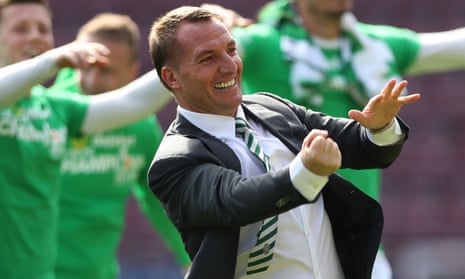That retaining the Scottish title was a given for Brendan Rodgers when he took control at Celtic should not detract from the manner of that accomplishment. The fans will cherish a sixth title in a row – and well they might. The approach of the Celtic players from the first minute of this season, added to memory of the 1990s when those supporters looked on as Rangers lorded it over all and sundry, will contribute to worthwhile celebration.
The issue of available finance equalling success is overly simplistic. Ronny Deila, Rodgers’ predecessor, enjoyed resource that dwarfed the rest of the division but he did not achieve the dominance or style produced by the former Liverpool manager this season. There are many other examples, notably Ally McCoist’s recent failure to win promotion from the Scottish Championship when Rangers had far more personnel and financial power than the opposition. Thankfully, football is not yet an exact science.
The reboot of Rodgers’ career has been in line with Celtic’s improved fortunes. That much will be endorsed if he becomes only the third manager in the club’s illustrious history to secure the Treble. Rodgers is a clever strategist who had the confidence to sense a move to Glasgow would enhance his reputation when others may have warned against it.
His career plan will inevitably include a move back to England’s Premier League, where many have already disregarded the height of his star as Liverpool pursued a championship in a fashion they had long since forgotten. It is debatable whether the Anfield club is now any better off.
Even the 44-year-old may be slightly surprised at the immediacy of his success; qualification for the Champions League and an ongoing, unbeaten domestic run pose the legitimate question as to how improvement will be achieved next season. And what, it is reasonable to ask, will fulfil Rodgers throughout years two or three?
European qualifiers for teams such as Celtic remain treacherous ground. The club’s appeal has been enhanced by Rodgers and by the success of, for example, Moussa Dembélé but there remains no appetite to spend tens of millions on players. And why should there be? Sojourns into Europe are offset by the staple diet of Hamilton Academical and Ross County. Celtic’s central defence must improve if they are to become serious Champions League participants. For now the team are of average Europa League standing.
The intensity of Rodgers’ work has been visible through the approach of his players. Scotland may be regarded as an uncompetitive environment but teams do not commonly swat aside all before them in the manner Celtic have this season. With the title secure as long ago as the turn of the year, in effect, it would be natural – even in the subconscious – for players to lower their application levels. The opposite has happened, Celtic producing win after win either in swaggering style and, at times, grinding when necessary.
Rodgers has improved much of what he inherited. Celtic and a number of their players had flatlined under Deila. Dembélé’s stunning rise aside, Craig Gordon, Kieran Tierney, Stuart Armstrong, Liam Henderson, Scott Brown and Tom Rogic have made great strides. Dorus de Vries, Kolo Touré and Cristian Gamboa have thus far proven ineffectual signings but Scott Sinclair, rescued from the wilderness at Aston Villa, has also been reinvigorated.

The wider context of Celtic’s position is less endearing. It would be folly to ignore the lack of depth within the Premiership or draw comparisons with wide-margin title wins in nations with far more depth. If a lack of competition remains, even in the medium term, and there is no evidence that things will change, that is harmful both to the Scottish game and Celtic. Scotland, surely, must revert to a league scene where teams play each other only twice, if only to create the illusion that teams can get closer to the top.
For those involved and those looking on, there has to be at least some element of the unknown. In Scotland this is not a new phenomenon; monopoly or duopoly involving the Old Firm since Aberdeen were champions in 1985 has largely coincided with overall decline. It was Rangers, not Celtic, who triggered this with the vast spending of the Graeme Souness regime. There is now a contradiction within Celtic’s position: to defend Scottish football so their results are commended, while retaining clear ambition of an alternative, tougher and more lucrative scene.
Tiger Woods’s domination of golf was terrific because he was the best in the world by a considerable margin. When Celtic face opponents of a higher level it is inevitable that the difference in quality from their home market will prove significant. It is bridging that gulf that, through no fault of his own, will be Rodgers’ greatest challenge. Celtic’s manager can take heart from the past 10 months and the creation of such a mutually beneficial alliance.

Comments (…)
Sign in or create your Guardian account to join the discussion